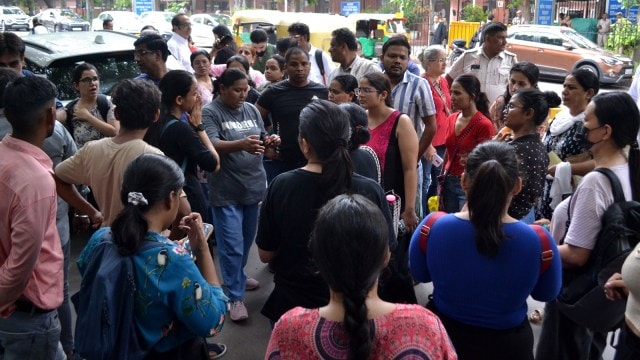SC stray dog order: How Bhutan achieved 100% sterilisation, Netherlands formed a pet police force
In 2023, India’s neighbour Bhutan recorded 100% sterilisation of its stray dog population under its “Nationwide Accelerated Dog Population Management and Rabies Control Programme”.
 Activists protest outside SC on Monday. (Express Photo)
Activists protest outside SC on Monday. (Express Photo)At a time when government agencies in Delhi-NCR are scrambling to come up with plans to accommodate stray dogs following the Supreme Court order, a few countries have managed to fix the issue.
In 2023, India’s neighbour Bhutan recorded 100% sterilisation of its stray dog population under its “Nationwide Accelerated Dog Population Management and Rabies Control Programme”. While the programme was introduced in 2021, the initiative to sterilise and vaccinate strays was spread over 14 years.
Starting 2021, a total of 61,680 dogs were sterilised, of which 56,251 (91%) were free-ranging dogs and the rest were pets. During the campaign 58,581 (95%) dogs were vaccinated against rabies and 32,544 pet dogs were microchipped and registered. In all, over 150,000 strays were sterilised.
The programme was implemented with a total budget of Rs 29 crore and was carried out by 12,812 personnel.
Netherlands, meanwhile, is among the first European countries with no stray dog population. The country was dealing with a large stray population in the late 1800s and early 1900s.
A research paper, ‘How Holland became free of stray dogs’ says that when the stray dog population in the country started to rise as a result of people abandoning pets, the first response from authorities was to cull them. Mandatory leash and muzzle laws were also established. Later, a ‘dog tax’ was introduced. This proved to be counterproductive since people started to abandon more dogs as they were unable to pay taxes.
At the end of the 20th century, the country passed a law against animal abuse.
What changed the game, however, was the implementation of three simple measures. First, the government imposed a heavy tax on store-bought dogs, which pushed the potential dog owners to adopt from the shelters. Second, it carried out the ‘CNVR’ programme which stands for Collect, Neuter, Vaccinate and Return.
Third, authorities launched a pet-police force that imposes fine and jail time for animal abuse and neglect, while also rescuing animals in trouble.The violation of this law is considered a criminal offence where the person can get a maximum prison sentence of upto three years and a fine of around €16,000.
Monday’s Supreme Court order also goes against India’s ABC Rules 2023.
The rules, notified in March 2023, state: “Dogs from only one area shall be brought for sterilisation, immunisation at a given time in the Animal Birth Control Center and effort must be made to avoid bringing into contact dogs from different areas. All the dogs caught shall be identified with a numbered collar immediately upon arrival at the Animal Birth Control Center and the number shall correspond to capture records to ensure that each dog is released, in the same area from where it was captured, after sterilisation and immunisation.”
This means that the present rules do not provide for any provision to capture dogs and relocate them.












